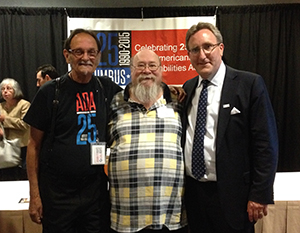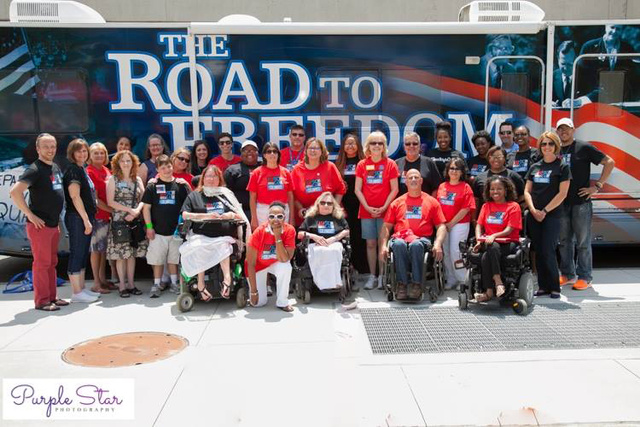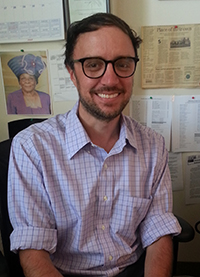News from Disability Rights Ohio is the monthly newsletter from Disability Rights Ohio, providing information and updates about case work and activities of the agency, and other disability-related news.
In This Issue:
- DRO celebrates 25 years of the ADA
- New rules for adult guardianship require annual training, background checks
- Disability coalition thanks Ohio policymakers for removing language that would have weakened DD Bill of Rights
- Staff Profile: DRO Attorney Kevin Truitt uses the ADA to break new ground
- DRO provides summary of final state budget bill
- DRO in the News
- Bills to Watch - Ohio ABLE Accounts
- Client Advocacy Outcomes
- Help us keep the victories coming! Donate online to Disability Rights Ohio
DRO celebrates 25 years of the ADA

At Disability Rights Ohio, the Americans with Disabilities Act of 1990 (ADA) is the basis of much of the work we do. It helps us open doors and level playing fields in community integration, employment and accessibility. This month, the 25th anniversary of the landmark legislation, DRO is taking time to reflect on how far we’ve come and renew our commitment to keep fighting to bring down barriers for people with disabilities in Ohio.
DRO staff members were asked: What does the ADA mean to you? Here are some of their answers:
Barb Corner, Lead Attorney, Employment Team
The ADA means I can go to a bus stop, and when the bus stops, a voice will announce the route number and destination. When I board the bus, the driver will direct me to an empty seat. As the bus travels, there will be announcements as to the next stop.
At one stop, the driver will deploy the ramp, and someone who uses a wheelchair will board the bus and the driver will tie down the wheelchair. Later on the route, he will deploy the ramp, and another individual who uses a wheelchair will be able to board. The driver may ask me to move back to the front-facing seats to make room for the wheelchair, and I will, with his assistance.
To encourage my guide dog to move and get under the seat, I will reward her with treats. The Central Ohio Transit Authority (COTA) made a modification to its “no food” policy to allow me to do that.
When it is my turn to get off, the driver will kneel the bus to make it easier for me to step onto the sidewalk. The ADA makes a big difference to me.

Lodia D’Angelo, Intake Specialist
The ADA means protection to me. It means there is a federal law that prohibits people or organizations from bullying people who happen to have a disability. It means that all people have rights and have recourse if somebody has the audacity to violate those rights.
Tara Cline, Clerical Assistant
The ADA means quality of life to me. It has allowed me to feel regarded as being worthy of doing the things people without disabilities do – work, shop, workout at the gym, go to the movies, attend sporting events and concerts, etc. It allows me to feel "normal."
Patrick Meehan, Clerical Assistant
My opportunity to work for DRO has been excellent for me, thanks so the ADA. I find that each and every day I have opportunities to grow more and also grow as a self-advocate. I always look forward to coming to work every day and am always willing to bring a positive attitude.
Michael Kirkman, Executive Director
The fight for the ADA brought all the disabilities communities together with a common voice, and that coalition has sustained. It magnificently changed the way society views people with disabilities. We think about what the person’s needs are, and, more important, their wants.
Darcie Dunzweiler, Community Work Incentive Coordinator (CWIC), Work Incentives Planning and Assistance (WIPA) Team
The ADA is a good start. Now we need to keep this disability rights movement going in the right direction, picking up steam, and gaining momentum! Consider the area of employment: people with disabilities have gone from having no opportunities, to working for a piece rate in segregated workshops, to now, thanks to the Olmstead decision, working toward finding employment in the community for at least minimum wage. Progress!
Related news:
Columbus Dispatch – Americans with Disabilities Act changed the law and attitudes of our society
All Sides with Ann Fisher - Americans with Disabilities Act Turns 25
New rules for adult guardianship require annual training, background checks
The Supreme Court of Ohio recently adopted new rules about adult guardianships, Rules of Superintendence 66.01 through 66.09, which went into effect on June 1, 2015. The purpose of the rules is to provide guidance about responsibilities and best practices to guardians of adults. The rules also give guidance to courts in appointing and monitoring the activities of guardians. The Court rules are in addition to, and do not replace, Ohio’s laws governing guardianship, which are found under Chapter 2111 of the Ohio Revised Code.
The Court felt the new rules were necessary to make guardianship responsibilities the same in all of Ohio’s 88 counties and to make sure that the rights and well-being of people under a guardianship are protected by those entrusted as guardians over them. Serious problems with Ohio’s adult guardianship scheme were documented in the Columbus Dispatch’s series of articles, “Unguarded,” including abuse, neglect and exploitation of persons under guardianship by their guardians.
DRO has created new fact sheets about the rule changes: one for guardians and one for individuals who have a guardian. Read them and download the PDF versions at the links below:
Ohio’s New Rules for Adult Guardianship
What You Should Know about Ohio’s New Guardianship Rules If You Have a Guardian
Disability coalition thanks Ohio policymakers for removing language that would have weakened DD Bill of Rights
On July 21, a coalition of 11 disability organizations sent a letter to Governor Kasich and key members of the Ohio General Assembly, thanking them for removing language from the state budget bill that would have changed the Developmental Disabilities Bill of Rights without the input of people with disabilities.
Read the full text of the letter.
Staff Profile: DRO Attorney Kevin Truitt uses the ADA to break new ground

Like many people, DRO Attorney Kevin Truitt became interested in fighting systemic injustice because of a personal experience.
“Through the end of college and into the beginning of law school, I experienced the injustices of our healthcare system firsthand during a serious illness,” he recalls. “Around that time, I also read a book, A People’s History of the United States by Howard Zinn. Those two things together ignited a passion in me. I saw how unfair things can be, and I knew I wanted to help people who wouldn’t otherwise be able to help themselves.”
During law school at Capital University, he worked at both the Ohio Civil Rights Commission and the Civil Rights section of the Ohio Attorney General’s office. That strengthened his desire to be part of a progressive social movement. His first job out of law school was at a small law firm, where he got to do a variety of different kinds of work, including Social Security Disability cases.
“I met a lot of really amazing people doing that work,” Truitt says. “Most importantly, it really piqued my interest in disability law, so when a position opened at Ohio Legal Rights Service (now Disability Rights Ohio) in the summer of 2007, I jumped on the opportunity.”
Early in his DRO tenure, Truitt continued to have a varied caseload, from Social Security overpayment cases to cases about disability discrimination. Starting in 2013, he became the leader for the Community Integration team, which focuses its work on breaking down the barriers that keep people from being able to fully participate in community life. The Americans with Disabilities Act forms the legal foundation for most of this work.
“The ADA and the Olmstead decision are very powerful,” he says. “I like being able to push those laws in new directions so our society continues to progress.”
DRO’s case Mooneyhan v. Husted gave Truitt the opportunity to help set that kind of legal precedent under the ADA. On Election Day in 2012, the client was hospitalized in a psychiatric hospital hundreds of miles away from her county of residence. She had requested an absentee ballot, but it didn’t arrive. Under Ohio law, if a voter hasn’t received her absentee ballot, she can vote in person on Election Day—but that isn’t possible when she’s in a psych hospital. She requested an accommodation so she could still vote, but the county Board of Elections and the Ohio Secretary of State’s office both refused. She called DRO, and the lawsuit was filed that day.
“It was an exciting day,” Truitt remembers. “Ultimately, the court sided with us. The state of Ohio has to accommodate a voter who is hospitalized outside of his or her county and is unable to vote in person because of his or her disability. It was the first case of its kind, and I’m proud that other people around the country might now be able to vote in those situations because of work we did. And the legal principles in this case can be extended to other voting rights situations as well.”
DRO provides summary of final state budget bill
On June 30, 2015, Governor Kasich signed House Bill 64, the state budget bill, into law. DRO has created a document to summarize some of the major issues from the budget that impact people with disabilities. The budget bill, in addition to setting out how many dollars the state will bring in and spend, also contains important policy developments.
Now that the budget process is over, it is important for people with disabilities and their advocates to follow the implementation of these key budget provisions to ensure that they operate fairly and effectively. It is critical to ensure that people with disabilities have a voice in implementation of the budget’s policy developments.
For more information on the changes in the state budget bill or any other policy developments contact DRO’s intake line at 800-282-9181, option 2.
DRO in the News
Reporter Tracy Zollinger Turner of the Short North Gazette discusses the problem of accessibility in Columbus’ Short North neighborhood. DRO Attorney and Short North resident Kevin Truitt is quoted.
Short North Gazette – Navigating the Urban Landscape: How accessible is the Short North for the disabled?
---
Cincinnati-area mother Denise Watts has filed suit against the Greater Miami Valley YMCA, alleging that the organization excluded her 6-year-old son, who has Down Syndrome, from activities because of his disabilities. The Associated Press story by reporter Lisa Cornwell was picked up by hundreds of newspapers nationwide. The NBC News story was featured on the national NBC News website. DRO Attorney Kevin Truitt is quoted in both stories.
Associated Press – Mom Sues Ohio YMCA, Says It Excluded Boy with Down Syndrome
NBC News – Ohio Mom Sues YMCA for Excluding Son with Down Syndrome
---
Ohio’s proposed Guardianship Bill of Rights is paired with proposed legislation that would extend foster care to children up to age 21, rather than the current cut-off at age 18. Columbus Dispatch Reporter Rita Price discusses both issues and the chances the bill may be passed this year. DRO Executive Director Michael Kirkman is quoted.
Columbus Dispatch – Bill would extend foster care 3 years: Plan hopes for better future to help state’s most vulnerable youth
Bills to Watch:
Ohio ABLE Accounts
On July 16, Governor Kasich signed Ohio House Bill (HB) 155, which requires the Ohio Treasurer of State to create a system for accounts under the Federal Achieving a Better Life Experience (ABLE) Act. The ABLE Act allows savings beyond the current Social Security or Medicaid asset limits, making it possible for people with disabilities and their families to save for disability-related expenses without losing their benefits. Qualified disability expenses are defined by each state, but they will include education, housing, transportation, employment support, health, prevention and wellness costs, assistive technology and personal support services. The bill’s requirements will take effect in October 2015 and the Treasurer of State’s office is planning to offer ABLE accounts to people with disabilities and their families by early 2016.
The Treasurer of State’s office is seeking comments about how people would like ABLE accounts to work, what Ohio should include as “qualified disability expenses,” and how the Treasurer of State should monitor spending from the accounts. To submit your comments and for more information about the accounts when they become available, check out the Treasurer of State’s Office ABLE website at www.ohiotreasurer.gov/Ohio_ABLE or email ABLE-Comments@tos.ohio.gov.
Client Advocacy Outcomes
Client completes welding program, with help from DRO
A client received his certificate of completion from the vocational program he had been attending for two years, in spite of the school’s efforts to prevent him from participating and then punishing him for disability-related behaviors.
The high school student with a disability wanted to attend the area vocational career center for welding. The individual was advised that he could not apply for the welding program, even though his career assessments showed his interests in manufacturing and welding types of employment. He was offered the center’s hospitality program instead because, he was told, it was the only program where he could get the supports and services he would need to participate in the career center programming. The client and his parent disagreed with the school and contacted Disability Rights Ohio.
DRO assisted the student in getting accepted into the welding vocational program and negotiated appropriate accommodations, supports and services that allowed student to successfully complete the two-year vocational welding program.
Help us keep the victories coming! Donate online to Disability Rights Ohio
We believe people with disabilities should be allowed to participate in the community and have a say in how they live, just like people who live without a disability. There is always more to do, but we need your help.
Disability Rights Ohio can now accept donations via PayPal. You can find the PayPal button on our Donate page. Please consider making a donation yourself or come up with a creative way to raise money for our cause. Thank you so much for your support!

